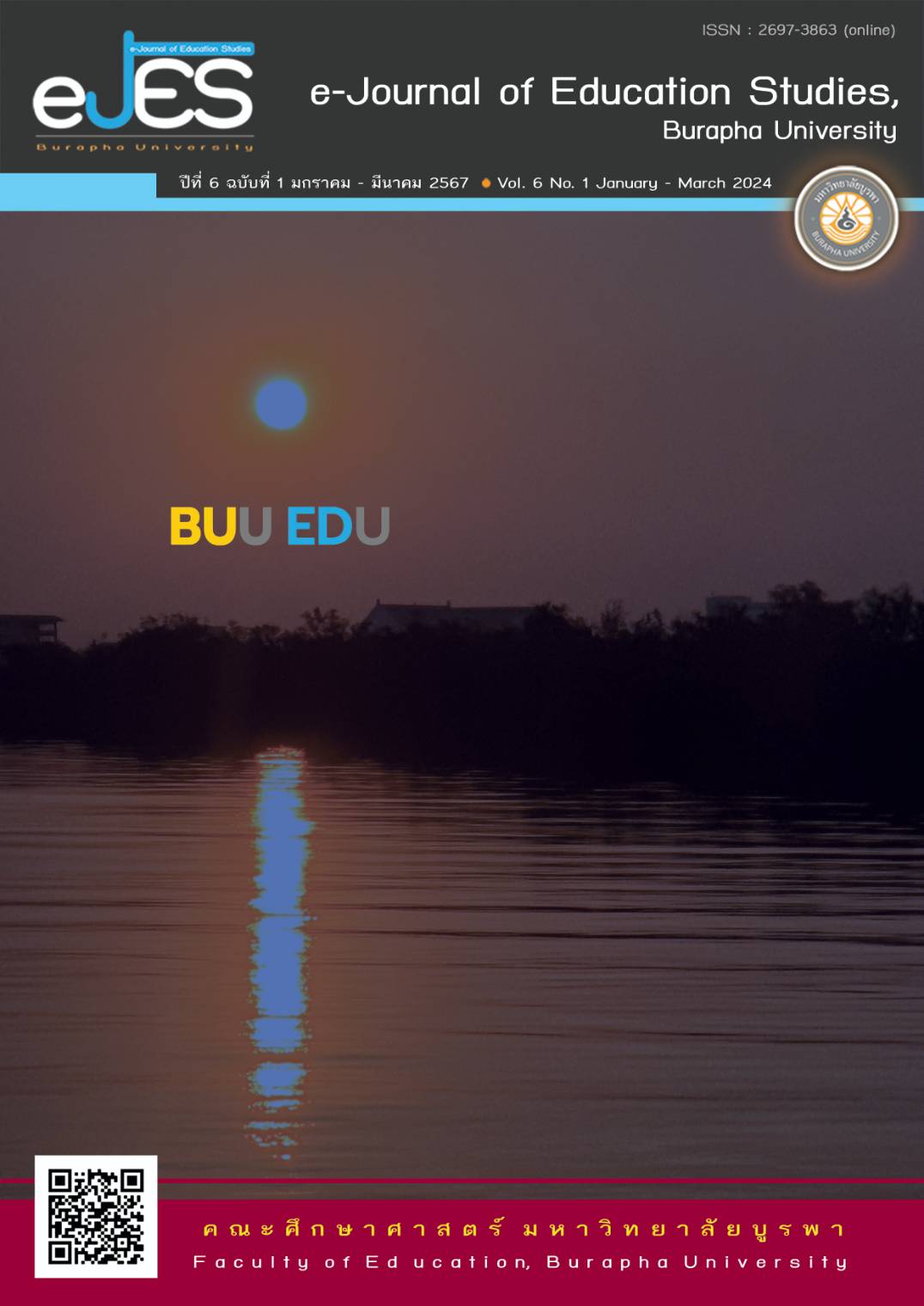ปัจจัยเชิงสาเหตุของความขัดแย้งระหว่างงานกับการศึกษาและภาวะความท้อแท้ ในการเรียนของผู้เรียนระดับบัณฑิตศึกษา
Main Article Content
บทคัดย่อ
การศึกษาในระดับบัณฑิตศึกษา นิสิตส่วนมากมีบทบาททั้งการทำงานและการเรียน จึงต้องจัดการต่อความรับผิดชอบทั้งบทบาทในการทำงานและบทบาทในการเรียน แต่หากการบริหารจัดการไม่ประสบความสำเร็จ นิสิตอาจเผชิญหน้ากับความขัดแย้งระหว่างงานกับการศึกษา และเกิดภาวะความท้อแท้ในการเรียนได้ ดังนั้นในการวิจัยครั้งนี้ มีวัตถุประสงค์การวิจัยเพื่อวิเคราะห์ปัจจัยเชิงสาเหตุที่ส่งผลต่อภาวะ ความท้อแท้ในการเรียนของนิสิตระดับบัณฑิตศึกษา โดยมีความขัดแย้งระหว่างงานกับการศึกษาเป็นปัจจัยส่งผ่าน ตัวอย่างวิจัยสำหรับการศึกษาครั้งนี้ เป็นนิสิตระดับบัณฑิตศึกษาจำนวน 160 คน การเก็บรวบรวมข้อมูลด้วยวิธี online survey โดยใช้แบบประเมินค่า 5 ระดับ สำหรับการเก็บรวบรวมข้อมูลปัจจัยต่าง ๆ ที่เกี่ยวข้องกับความขัดแย้งระหว่างงานกับการศึกษาและภาวะความท้อแท้ในการเรียน และวิเคราะห์ข้อมูลโดยการวิเคราะห์โมเดลสมการเชิงโครงสร้าง ด้วยโปรแกรม Mplus 8.10 ผลการวิจัยพบว่า โมเดลความสัมพันธ์ของตัวแปรที่ส่งผลต่อภาวะความท้อแท้ในการเรียน โดยมีความขัดแย้งระหว่างงานกับการศึกษาเป็นตัวแปรส่งผ่าน มีความลอดคล้องกับข้อมูลเชิงประจักษ์ (Chi-square(121, N = 160) = 232.818, p < .01, 𝜒2/df = 1.924, RMSEA = .076, SRMR = .119, CFI = .906, TLI = .884) โดยภาวะความท้อแท้ในการเรียน ได้รับอิทธิพลทางตรงจากความขัดแย้งระหว่างงานกับการศึกษา และได้รับอิทธิพลทางอ้อมจากทรัพยากรในการทำงานและความต้องการของการศึกษา
Article Details
เอกสารอ้างอิง
ธันยวนันฐ์ เลียนอย่าง. (2565). อิทธิพลทางสังคมจิตพอเพียงที่มีต่อพฤติกรรมการจัดการทางการเงินและความสมดุลในชีวิตการเรียนและการทํางานของนักศึกษาคณะบริหารธุรกิจ สถาบัน อุดมศึกษาเอกชน. วารสารศรีปทุมปริทัศน์, 22(1), 78-92.
รุ่งฤดี อุสาหะ เจียมจิต โสภณสุข สถติย์ วรรัตน์ สุขคุ้ม นันทยา เสนีย์ และ กาญจณา พรหมทอง. (2563). คุณภาพชีวิตนักศึกษาพยาบาลวิทยาลัยพยาบาลบรมราชชนนี ตรัง. วารสาร มฉก.วิชาการ, 24(1), 54-62.
วชิรวิชญ์ แสงโรจน์กิตติคุณ และ อรพินทร์ ชูชม. (2564). ปัจจัยส่วนบุคคลและปัจจัยสภาพแวดล้อมทางสังคมที่เกี่ยวข้องกับสมดุลชีวิต การทำงาน และการเรียนของนักศึกษาระดับบัณฑิตศึกษาในเขตกรุงเทพมหานคร. วารสารพฤติกรรมศาสตร์, 27(2), 63-77.
Abenoja, R., Accion, N., Aguilar, J., Alcasid, M., Amoguis, A., Buraquit, D., . . . Pame, J. (2019). The experiences of working while studying: A phenomenological study of senior high school students. Retrieved from https://osf.io/preprints/edarxiv/w5t7a/download
Andrade, C. (2018). Professional work load and work-to-school conflict in working students: The mediating effect of psychological detachment from work. Psychology, Society, and Education, 10(2), 215-224. doi:10.25115/psye.v10i1.1777
Cinamon, R. G. (2018). Navigating work and study: Antecedents and outcomes of conflict and facilitation aspects of the work-school interface. Journal of vocational behavior, 104, 31-43. doi:10.1016/j.jvb.2017.09.009
Demerouti, E., Bakker, A. B., Nachreiner, F., & Schaufeli, W. B. (2001). The job demands-resources model of burnout. Journal of Applied Psychology, 86(3), 499-512. doi:10.1037/0021-9010.86.3.499
Headrick, L., & Park, Y. A. (2023). How do working students fare? A person-centric approach to understanding patterns ofwork–school conflict and facilitation. Applied Psychology. doi:10.1111/apps.12493
Hobfoll, S. E., Halbesleben, J., Neveu, J.-P., & Westman, M. (2018). Conservation of resources in the organizational context: The reality of resources and their consequences. Annual Review of Organizational Psychology and Organizational Behavior, 5. doi:10.1146/annurev-orgpsych-032117-104640
Kremer, I. (2015). The relationship between school-work-family-conflict, subjective stress, and burnout. Journal of Managerial Psychology, 31(4), 805-819. doi:10.1108/JMP-01-2015-0014
Laugnman, C., Boyd, E. M., & Rusbasan, D. (2016). Burnout as a mediator between work–school conflict and work outcomes. Journal of Career Development, 43(5), 413-425. doi:10.1177/0894845316633523
Lingard, H. (2007). Conflict between paid work and study: Does it impact upon students’ burnout and satisfaction with university life? Journal for Education in the Built Environment, 2(1), 90-109. doi:10.11120/jebe.2007.02010090
Markel, K. S., & Frone, M. R. (1998). Job characteristics, work–school conflict, and school outcomes among adolescents: Testing a structural model. Journal of Applied Psychology, 83(2), 277. doi:10.1037/0021-9010.83.2.277
Meeuwisse, M., de Meijer, L. A. L., Born, M. P., & Severiens, S. E. (2017). The work–study interface: similarities and differences between ethnic minority and ethnic majority students. High Educ 73, 261-280. doi:10.1007/s10734-016-0012-1
Robertson, K. (2019). The antecedents of work-school conflict and work-school enrichment. (Master’s thesis). University of Cape Town, Retrieved from https://open.uct.ac.za/items/18c2bf6d-995a-41ce-ae33-b8191665c21c Open University of Cape Town (OpenUCT) database.
Shahzad, K., Iqbal, R., Javed, B., & Hashmi, S. D. (2021). Impact of work-study conflict on workplace outcomes: Supervisor support for juggling many balls. International Journal of Conflict Management. doi:10.1108/IJCMA-05-2021-0069
Soper, D. (2022). Calculator: A-priori sample size for structural equation models. Retrieved from https://www.danielsoper.com/statcalc/calculator.aspx?id=89
Tanner, K. (2018). Survey designs. In K. Williamson & G. Johnson (Eds.), Research Methods: Information, Systems, and Contexts (pp. 159-192): Chandos Publishing.
Wan, M., Feng, L., X., M.,, Zhai, M., & Konkpaske, R. (2021). Working college students’ time pressure and work-school conflict: Do boundary permeability and dispositional mindfulness matter? . Psychological Reports, 1-26. doi:10.1177/00332941211029621
Wyland, R. L., Lester, S. W., Ehrhardt, K., & Standifer, R. (2016). An examination of the relationship between the work–school interface, job satisfaction, and job performance. Journal of Business and Psychology, 31, 187-203. doi:10.1007/s10869-015-9415-8



